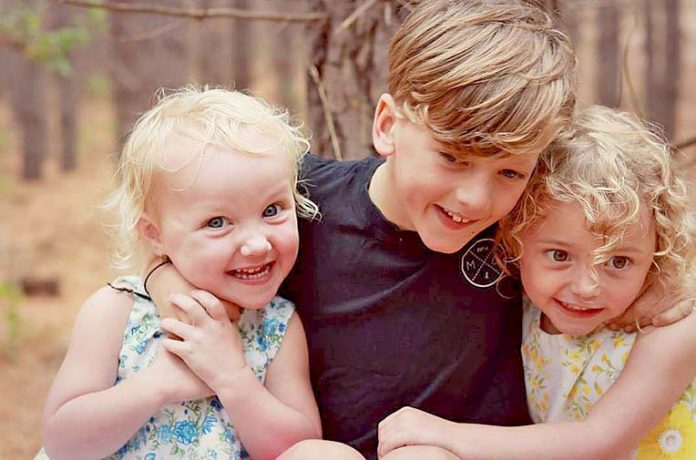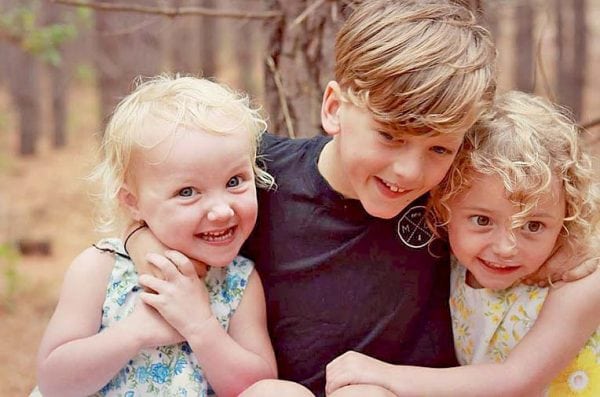

WHEN her daughter started frequently falling in and out of trance-like states, alarm bells rang for Natalie Fox.
However, the Millicent mother of three had no idea the “staring episodes” she was witnessing were actually seizures.
Natalie’s daughter Pensee, 3, was diagnosed with epilepsy – a disorder in which nerve cell activity in the brain is disturbed – almost a year ago and with no family history, the diagnosis of the neurological disorder came as an unpleasant surprise.
“Pensee started to daydream and would not respond to me for a few seconds – then she would be totally fine,” Natalie said.
“I had no idea what was going on until a friend asked me if I had heard of silent seizures.
“I did some research and waited to see if her symptoms matched, a few days later she did it again.
“This time her arms shook and she came out of it upset and not knowing what happened.
“I took her straight to the doctors who booked her in to see the paediatrician in Mount Gambier.”
In addition to the silent seizures, Pensee had developed an eye twitch and would blink continuously.
After watching video footage and the then two-year-old’s eye twitching firsthand, the paediatrician was able to give an “unofficial” diagnosis of epilepsy.
Pensee was officially diagnosed shortly after speaking to a neurologist and she was given the appropriate medication.
“She used to have seizures daily and they would last 10 to 30 seconds at a time,” Natalie said.
“They were brought on by lack of sleep and we tried the medication, but it made her angry all the time and she literally never slept on it.
“She was going to bed at around 11pm and then she would be back up at 3am for the day.
“We spoke to her neurologist about changing the medication and weaned her off it to trial something new.
“She slept for the first time in forever and her seizures stopped being so frequent, now she only has them every few weeks”.
However, while Pensee’s epilepsy was somewhat under control, Natalie and her husband Nick started noticing changes in their youngest child Pacey.
“Pacey has had a few seizures,” Natalie said.
“I witnessed and videoed her in November last year, she just sat there and stared for what felt like forever.
“Her arm twitched and her lips looked like she was chewing – it lasted on and off for about three minutes.
“I just sat there and cried, I could not believe we had ended up with two (children) with epilepsy.
“Luckily she has not had many more.”
Around two months later marks had started appearing on the two-year-old’s face, back and legs.
Natalie booked her into the doctors for a check-up and they suggested Pacey may have a genetic disorder.
While uncertainty still surrounds the root to Pacey’s condition, Natalie and Nick may finally get some answers later this month when they see a neurologist in Adelaide.
Both of the girls have appointments booked with specialists and will undertake electroencephalography (EEG) tests, which is an electrophysiological monitoring method used to record the electrical activity of the brain.
Pacey will also have her first genetic specialist appointment at the Women’s and Children’s Hospital, which will determine if she has neurofibromatosis (NF) – a group of three conditions where tumours grow in the nervous system.
“I believe if Pacey’s results come back saying she has NF there is no treatment,” Natalie said.
“Also if they come back positive then Pensee will also have to be tested as epilepsy is a symptom of the condition.
“I try so hard not to think about it.
“Luckily, there are a few different types and Pacey has not had any tumours yet, so fingers crossed.”
Natalie added while watching her daughters seizures was difficult, the Fox family’s everyday life had not been affected.
“A lot of people say they would not know how to handle it, but to be honest it is not much of a life change at all,” she said.
“We are pretty cruisey as it is and deal with anything.”
Natalie further emphasised the importance of raising awareness about epilepsy and neurological disorders.
“I had no idea about the different type of seizures there were until Pensee had one,” she said.
“I definitely did not believe that Pensee’s staring episode was a seizure, but after seeing videos and talking to people epilepsy has opened my eyes to a whole new world.
“You honestly do not know what’s out there and compared to so many other cases that we have seen we have it easy, we are still learning though.”







